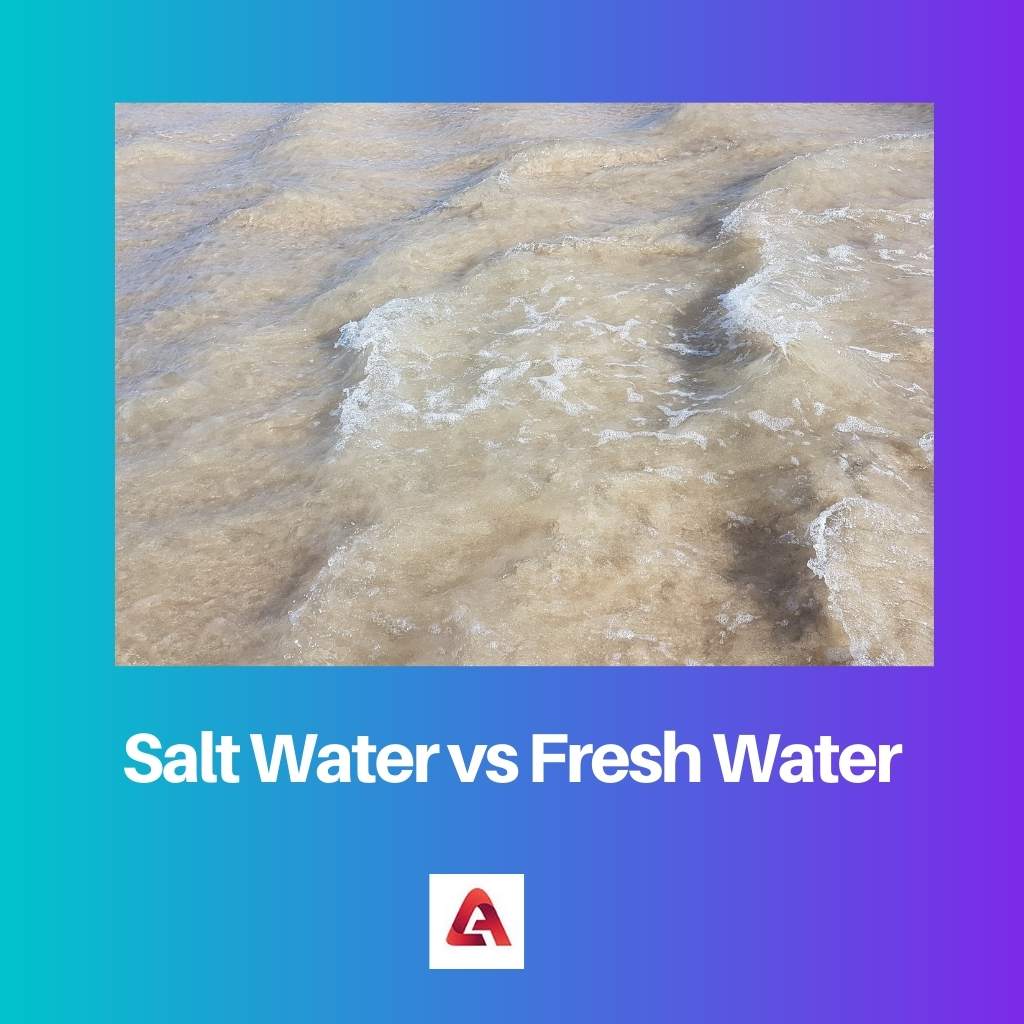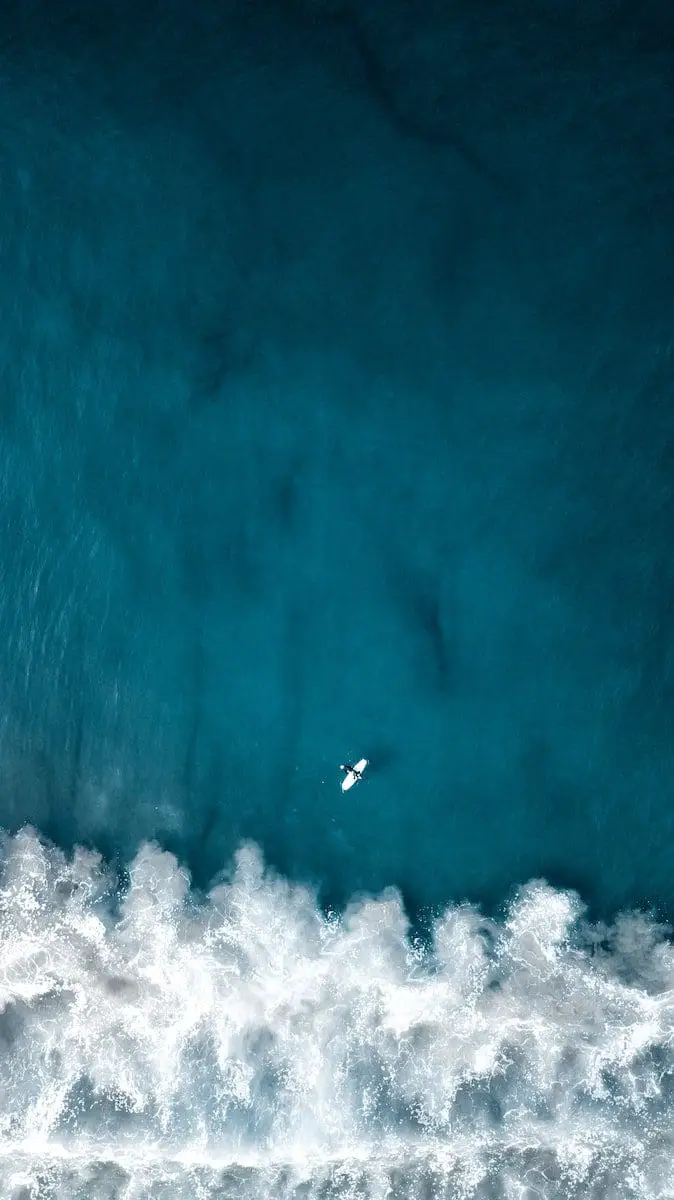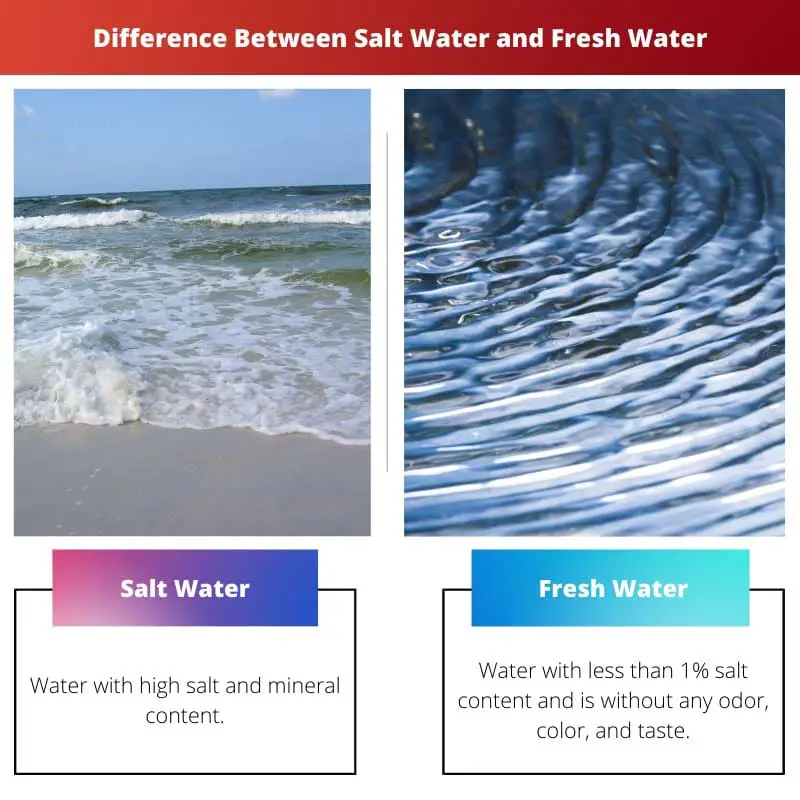Our planet is covered with both huge masses of land and water everywhere. Although water comprises the maximum part of the earth, it has many forms and sources for various organisms to collect and use it.
The oceans and seas are full of saline water; thus, glaciers and ice caps have fresh water.
Note: Fresh water is defined as having a TDS value of less than 3,000 mg/L. TDS levels between 3,000 and 10,000 mg/L are regarded as brackish water. Water that contains more than 10,000 Mg/L will be regarded as salinity. Brine is the common name for groundwater that has a salinity higher than seawater (approximately 35,000 mg/L).
Key Takeaways
- Saltwater has a higher salinity level than freshwater.
- Fish and other marine life thrive in saltwater, while freshwater is suitable for some species.
- Freshwater sources include lakes, rivers, and groundwater, while saltwater sources include oceans, seas, and saltwater lakes.
Salt Water vs Fresh Water
The water present in the sea is salt water. Saltwater is not suitable for humans to drink. Saltwater contains high amounts of salt and other minerals in it. The freezing point of saltwater is -2℃. The water in the rivers or streams can be freshwater. Humans can drink fresh water. Freshwater has no color or taste. The freezing point of freshwater is 0℃.

Salt Water is the water present in the oceans and seas with a greater percentage of salt and minerals. Because of the high salinity levels, it is unsafe for drinking or any other purposes for humans.
Saltwater is considered to have much more density. Some examples of fish living in saltwater are – sharks, tuna, yellowtail, bluefish, albacore, common dolphins, eels, etc.
Fresh Water is defined as water that has a composition of salt less than 1% in it and is colorless, tasteless, odorless. The freshwater sources available to humans are lakes, streams, ponds, wells, etc.
The water collected from the rain is also a source of fresh water. Freshwater is present on the earth in very little quantity and must be used efficiently. Some examples of freshwater fishes are – catfish, cisco, sunfish, etc.
Comparison Table
| Parameters of Comparison | Salt Water | Fresh Water |
|---|---|---|
| Definition | Water with high salt and mineral content. | Water with less than 1% salt content and is without any odor, color, and taste. |
| Sources | Sea and Oceans | Lakes, Ponds, Streams, etc. |
| Density | High density | Low density |
| Freezing Point | -2 °C | 0 °C |
| Examples of Fishes | Marlin, mackerel, snapper, cod, butterfish, etc. | Salmon, pike, trout, catfish, charr, etc. |
What is Salt Water?
Saltwater is also known as saline water this is so because of the presence of high amounts of salt present in it. Saline water is present in the oceans and sea.
As the earth is covered by 97% of water and the majority is of seas and oceans thus, ultimately, the percentage of availability of saltwater is more.
Different scientists measured the salinity of the saltwater, and the result of it they concluded that per litre of saltwater (seawater) contains about 35 grams of salt. It is measured in parts per thousand (ppt), thus meaning 35 ppt.
Scientists have studied the properties of saline or saltwater, in which one of them is about their boiling and freezing point, which is both different from freshwater.
As the main concern is related to the freezing point of the saltwater thus, it is lower than -2 C and may be lower than that. This is because of the presence of salt content in the water.
Another property concerned with it is the tonicity of the water, which is related to the concept of osmosis.
The water moves through a semi-permeable membrane to the side where is a high solute concentration to make even the solution.
Therefore, salt water is a hypertonic solution and has to be consumed frequently to absorb water and eliminate salts by the organisms living there.

What is Fresh Water?
Freshwater is defined as water that has a low salt concentration in it, along with that it does not have any taste, odour, or color. The sources of freshwater can be divided into standing reservoirs like ponds, lakes, and inland wetlands and floating reservoirs like rivers, streams, etc.
The percentage of the freshwater available on the earth is very limited, about 3% of which almost 1% is available to humans, as the rest is preserved as ice caps and glaciers.
The organisms that cannot live in extreme hot or cold are found in freshwater. Some examples of fish living in freshwater are – Salmon, pike, trout, catfish, char, cisco, sunfish, etc.
The density of fresh water is about 1 g/mL, which is less than that of saltwater. Scientists have studied various properties of freshwater, and thus, tonicity is one of them.
The organism whose habitat is freshwater uses the phenomenon of osmoregulation, which is, to be precise, is a process that absorbs water and frequently excretes it out from its body to even the salt concentration.

Main Differences Between Salt Water and Fresh Water
- Saltwater is water with a high content of salts and minerals, whereas freshwater contains salts and minerals in less than 1%.
- The main source of saltwater is oceans and seas, while the main source of freshwater is lakes, ponds, rivers, streams, etc.
- The density of saltwater (or saline water) is quite high and measures about 1.025 grams/mL, while freshwater density equals 1 g/mL.
- The freezing point of saltwater (or saline water) is around –2 °C, while the freezing point for freshwater is about 0 °C.
- Examples of fishes living in saltwater are – Marlin, mackerel, snapper, albacore, shark, tuna, yellowtail, etc., while some examples of fishes living in freshwater are – catfish, cisco, sunfish, salmon, pike, char, etc.

- https://www.sciencedirect.com/science/article/abs/pii/037702659390046A
- https://www.sciencedirect.com/science/article/abs/pii/S0379073819300866
- https://setac.onlinelibrary.wiley.com/doi/full/10.1002/etc.5620211127?casa_token=JXEsP_EhMXQAAAAA%3Abt4IrziiVMEB8CJCZfzP27kh2K2-B2rSQ930AWwVa2qB0veHGrUu1qzHEUmGsQWHJPkyRWJncSynFA
- https://www.sciencedirect.com/science/article/abs/pii/S0025326X01001357
Last Updated : 24 June, 2023

Piyush Yadav has spent the past 25 years working as a physicist in the local community. He is a physicist passionate about making science more accessible to our readers. He holds a BSc in Natural Sciences and Post Graduate Diploma in Environmental Science. You can read more about him on his bio page.

The delineation of the properties and sources of saltwater and freshwater was exceedingly enlightening. It underscores the critical role that these two types of water play in sustaining aquatic ecosystems.
Absolutely, Chapman Michael. The detailed exploration of saltwater and freshwater characteristics provides valuable insights into the delicate ecological balance maintained by these distinct types of water.
The detailed comparison between saltwater and freshwater was very insightful. It’s crucial to acknowledge the scarcity of freshwater and the necessity of using it efficiently for various life forms.
I couldn’t agree more, Selina Robertson. The article offers a comprehensive understanding of the distinctive characteristics and ecological relevance of saltwater and freshwater.
Well said, Selina Robertson. The depth of information provided about the properties and significance of saltwater and freshwater was impressive.
This article provided a very detailed and informative comparison between salt water and fresh water. It’s interesting to know that the freezing point of saltwater is lower than that of freshwater due to the presence of salt content. The examples of fishes that thrive in each type of water were also very insightful.
I completely agree, Mary82. The in-depth analysis of the properties of saltwater and freshwater is very educational.
The thorough explanation of the differences in the sources and characteristics of saltwater and freshwater is commendable. It provides a clear understanding of these two types of water.
The detailed comparison between saltwater and freshwater sources was highly informative. It’s imperative to recognize the ecological implications of maintaining a balance between these two types of water.
Absolutely, Charles91. The article articulated the ecological significance of saltwater and freshwater sources exceptionally well, emphasizing the need for conservation and preservation.
The detailed insights into the properties and composition of saltwater and freshwater were truly enlightening. It’s crucial to acknowledge the environmental impact of these two types of water.
Absolutely, Dennis42. The information provided about the ecological implications of saltwater and freshwater is essential for promoting environmental stewardship and conservation efforts.
The detailed explanations of saltwater and freshwater characteristics were highly informative. It’s important to appreciate the ecological nuances and balance between these two types of water.
The information about the density and freezing points of saltwater and freshwater was particularly enlightening. It’s fascinating to learn about the scientific aspects that differentiate these two types of water.
I couldn’t agree more, Carole Jones. The comparison table between salt water and fresh water was presented in a very structured and organized manner, making it easy to comprehend.
The detailed explanation of the properties of freshwater and the limited availability of it on Earth was thought-provoking. It underscores the importance of utilizing freshwater resources efficiently.
The article offered an in-depth and comprehensive comparison of saltwater and freshwater. It’s essential to raise awareness about the ecological significance of these two types of water for environmental sustainability.
I completely agree with you, Courtney Hunter. The article effectively communicated the importance of understanding the properties and ecological roles of saltwater and freshwater.
The detailed explanation of the sources of saltwater and freshwater was very informative. It’s crucial to understand the distinct characteristics of these two types of water for environmental and ecological reasons.
I share the same sentiment, Xrogers. The content provided a comprehensive insight into the significance of maintaining a balance between saltwater and freshwater ecosystems.
The article effectively highlighted the differences between saltwater and freshwater, shedding light on their respective properties and characteristics. This knowledge is essential for appreciating the distinct ecosystems they support.
Indeed, Rroberts. The comparison table and the detailed descriptions emphasized the importance of saltwater and freshwater in sustaining diverse aquatic life forms.